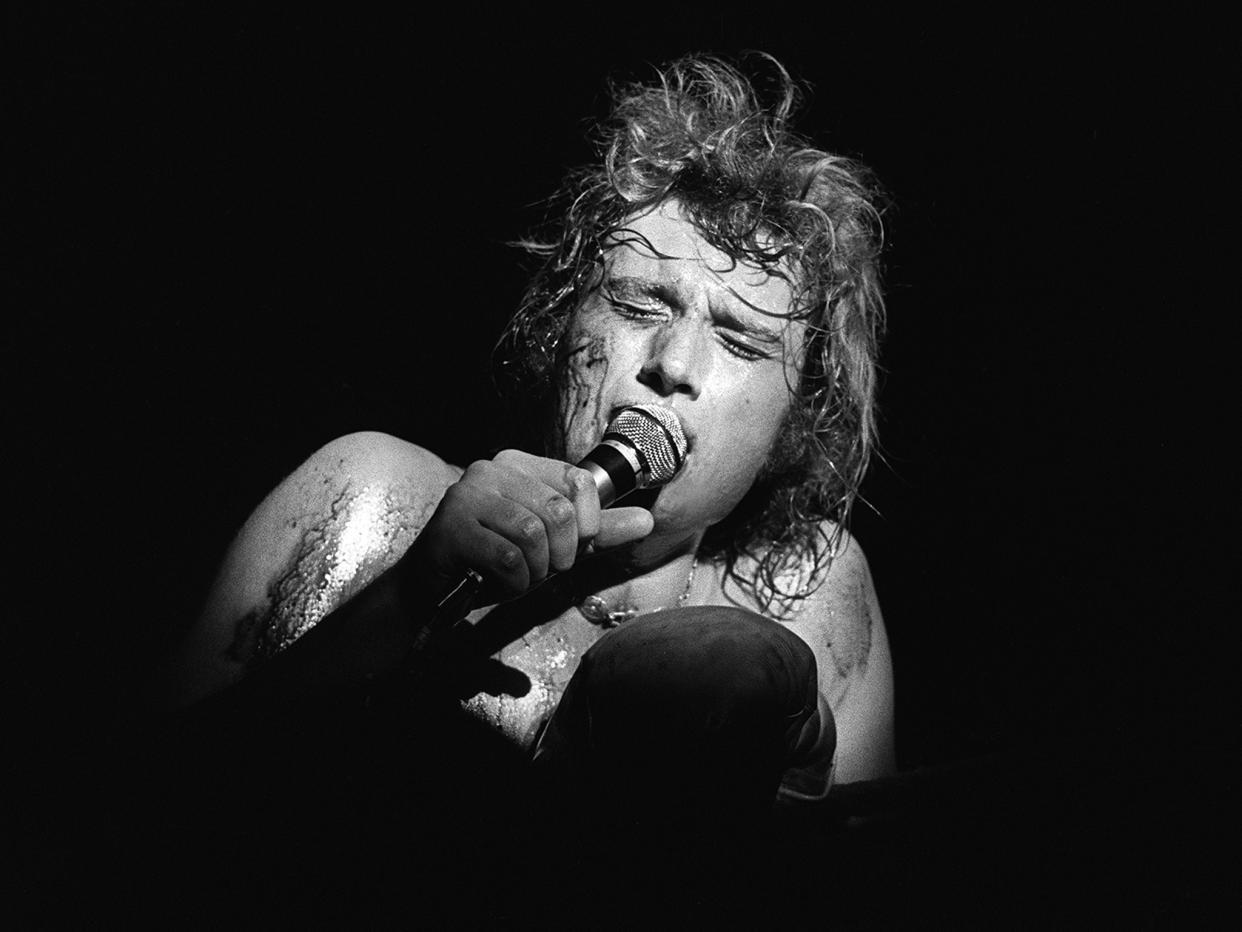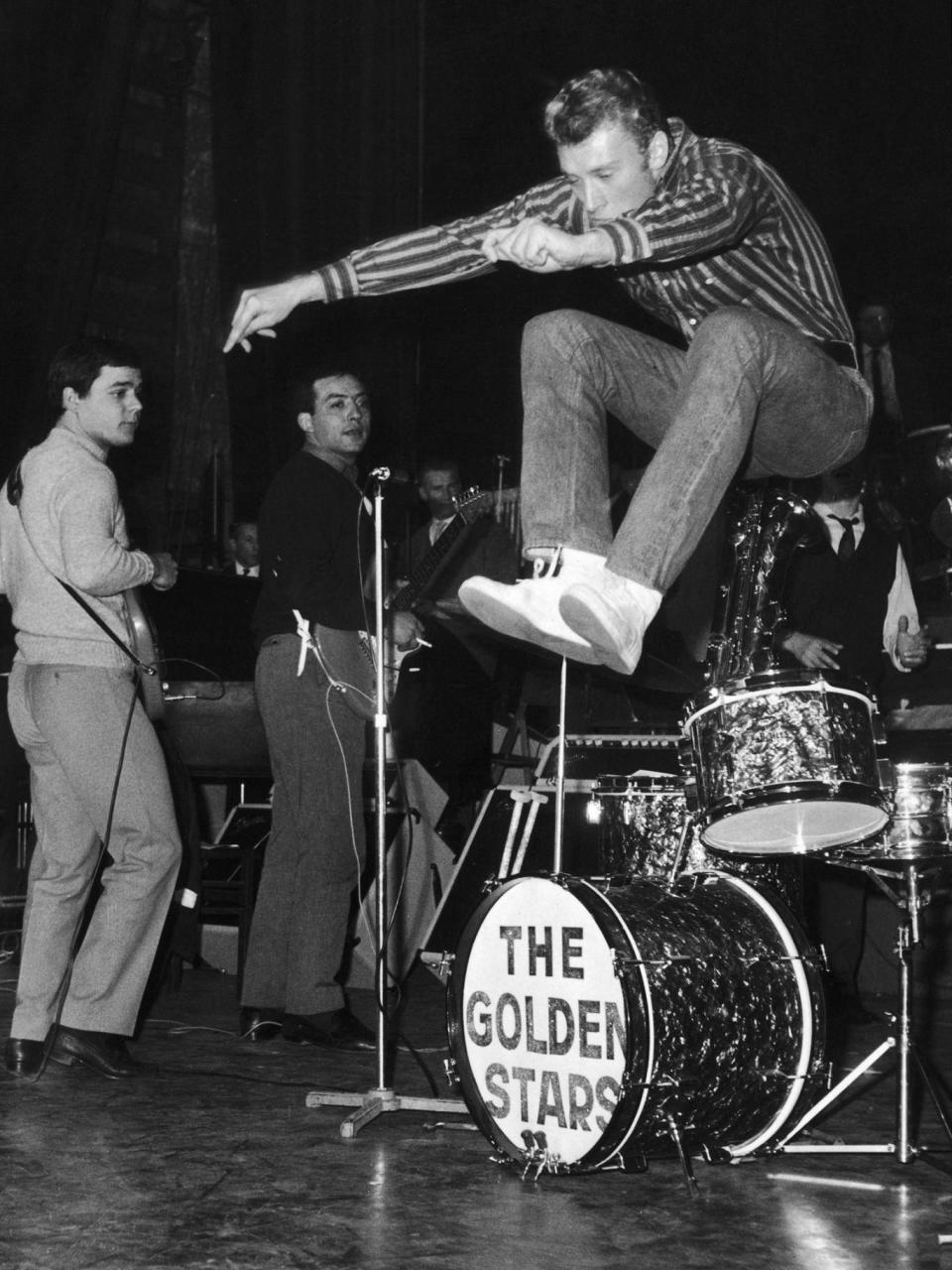Johnny Hallyday: The 'Elvis Presley' of France who brought rock'n'roll to the French-speaking world

Johnny Hallyday, who has died aged 74, was the singer who helped bring rock‘n’roll to France, where he sold more than 110 million records, rivalled the Eiffel Tower in popularity and acquired the status of an unabashedly Gallic – and consistently inexportable – Elvis Presley.
Although Hallyday was often described as his country’s Elvis, the most popular of its rock stars and as swaggering as the King, he was also France’s David Bowie, Tom Petty, Bruce Springsteen and Bono, a chameleonic rocker who endured cultural changes that he alternately spurned and spurred.
He sang against long-haired peaceniks one year (“long of hair, short of ideas”), likened hippies to Jesus Christ the next, appeared in more than 30 films and – decades after his emergence on the pop music scene – was chosen to perform at an anniversary concert for the victims of the 2015 Charlie Hebdo terrorist attack in Paris.
Hallyday’s appeal was a mystery to many outsiders, who wondered how a culture that valued the elusive quality of “Frenchness” above all else could fall for a man who once moved to Switzerland for tax reasons, applied for citizenship in Belgium, Americanised his name and sought to infuse his music with the idealism of Norman Rockwell paintings and Western films.

He harnessed the same youthful energy that had propelled James Dean to stardom in Eisenhower-era America, displaying attire and behaviour that hardly differed from those of other leading rockers: tight trousers, leather jackets, guitar-smashing antics, a tumultuous love life and a cocaine habit that he said he used to “kickstart my motor” before performances.
Sporting a bright baritone voice that switched occasionally from French to English, he recorded songs that were initially little more than French variations on English-language hits, including The Animals’ “The House of the Rising Sun” (“Le Pénitencier”), Chubby Checker’s “Let’s Twist Again” (“Viens Danser le Twist”) and Jimi Hendrix’s “Hey Joe”.
Although he performed few original tracks in his early years, he ushered in a cultural revolution in France, where pop music had long been dominated by the gentle ballads of chanteurs Edith Piaf and Charles Aznavour.
Hallyday, France’s Le Figaro newspaper once wrote, was “venerated on the right and the left, by the people and the intelligentsia, and, above all, recognised for what he has always been: a sincere artist, a phenomenon on stage, whose every song sticks in the memory of millions of French people.”
He was initially condemned by President Charles de Gaulle and other political leaders who saw his rock covers as an expression of cultural imperialism. But Hallyday became a favourite of French presidents such as Jacques Chirac, who reportedly helped him and his wife adopt a baby, and Emmanuel Macron, who praised Hallyday in a statement for bringing “a part of America into our national pantheon”.
The cultural exchange seemed to work only one way, however. Referred to by USA Today as “the biggest rock star you’ve never heard of”, Hallyday was largely unknown in the Anglo-Saxon world, attracting scant attention in US and UK, where he recorded in the 1960s and learned from guitarists Jimmy Page and Hendrix.
“My international career? It’ll happen if it happens,” Hallyday once said. “But I don’t specially want to succeed elsewhere. It’s better to be king in one’s own country than a prince elsewhere.”
Hallyday was born in Nazi-occupied Paris in 1943, with the decidedly unhip name of Jean-Philippe Léo Smet. His mother was French and his father, an alcoholic who abandoned the family, was Belgian.
He was raised mainly by an aunt, a former silent-film actress who toured Europe with her two ballerina daughters and a young Jean-Philippe. The boy began singing and playing the guitar under the wing of an American, Lee Ketcham, in a family act called the Hallidays. He turned to rock music after seeing Presley’s 1957 movie musical “Loving You”.

Making his recording debut in 1960, he took the name Johnny from the 1954 western film Johnny Guitar and adopted the last name Hallyday after a misspelling by his record company, Vogue.
His career took off the following year, when a concert at the newly built Palais des Sports ended in a riot of leather-jacketed fans, terrifying cultural critics who thought Hallyday was a negative influence on the country’s youth. The criticism was somewhat abated after Hallyday, like his idol Elvis, served briefly in his country’s military.
Hallyday was married five times, including a 1965 marriage to French pop star Sylvie Vartan that ended in divorce. He had a son from his first marriage, singer David Hallyday, and a daughter, Laura, from a relationship with actress Nathalie Baye. He and the former Laeticia Boudou, his wife of 21 years, had two adopted daughters, Jade and Joy.
Hallyday was at times open about his turbulent personal life, and his 1966 song “Noir C’est Noir” was often linked to a suicide attempt after the birth of his son. In recent years, he seemed to treasure anonymity, living at times in Los Angeles, in a country where few people recognized him.
“I am not 20 years old anymore,” he told The Independent in 2009. “Perhaps, I’m a little tired of playing Johnny Hallyday. I want to be Jean-Philippe Smet again.”
Johnny Hallyday (Jean-Philippe Léo Smet), French singer and musician, born 15 June 1943, died 6 December 2017
© The Washington Post

